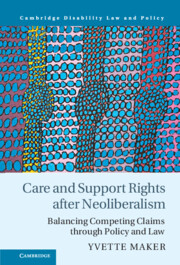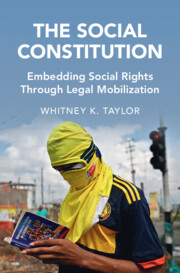Care and Support Rights After Neoliberalism
This book offers principles for designing care and support policy to address two persistent sources of tension in the field. The first is the tension between supporting women's unpaid caring and supporting their paid work participation. The second is the tension between carers' claims for support based on the 'burden' of caring and disability rights claims for support for choice and independence for people with disabilities. Policies tend to favor one activity and one constituency over the other. Consequently, individuals' access to resources and choices about how they live are constrained. Using a citizenship rights framework, with insights from human rights law, the principles provide guidance for designing policy and legislation that avoids 'either/or' approaches and addresses the interests of multiple constituencies. Analyses of Australian and English policies demonstrate the value of the principles for developing policy that reduces inequality, responds to 'failures' of neoliberalism, and expands choice for all.�
- Proposes a new framework for designing and evaluating care and support policy and includes illustrations of how the framework would apply
- Brings together scholarship from traditionally separate and 'siloed' areas and will appeal across multiple disciplines
- Innovative contribution in emerging field of disability human rights law and policy
Reviews & endorsements
‘The fundamental social problem that the book attempts to address is marginalization of those who require care and/or provide care in 'liberal welfare states'' Poland Lai, Canadian Journal of Law and Society/La Revue Canadienne Droit et Société
Product details
April 2022Adobe eBook Reader
9781108620727
0 pages
This ISBN is for an eBook version which is distributed on our behalf by a third party.
Table of Contents
- Introduction
- Part I. Care Policy Tensions:
- 1. A feminist dilemma: support unpaid care or support paid work?
- 2. The universal caregiver model: expanding options or imposing new limits?
- 3. Disability rights and carers' advocacy: to reject or to recognize care
- 4. A disability rights informed ethics of care: interdependence and common humanity
- Part II. Balancing Competing Claims through Rights-Based Policy:
- 5. A new framework for designing rights-based care and support policy
- Part III. Care and Support Policy Tensions in Two Liberal Welfare States:
- 6. Income support for carers of children with disabilities in Australia: background and recent reforms to carer payment
- 7. Care, disability, and gender equality in carers' income support: narrow choices and unheard voices
- 8. Incorporating multiple options and perspectives: applying the care and support rights principles to carer payment
- 9. Care and support for adults in England: background and the recent Care Act reform
- 10. Care, disability, and gender equality in English care and support policy: well-being for all with resources for a few?
- 11. Maximizing options and opportunities: aligning the Care Act with the care and support rights principle
- Conclusions.









